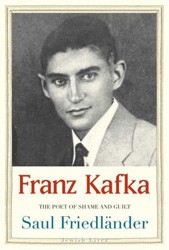The Years of Insight is the last installment of Reiner Stach’s extensive, three-volume biography of Franz Kafka, impeccably translated into English by Shelley Frisch. Each volume is crafted such that one simply must read the other two: Stach peppers his writing with tantalizingly vague references and foreshadowings to elsewhere in the series, and his allusions compel the reader to absorb Kafka’s complete biography from start to finish.
And Kafka is just that: a complete biography. Stach deconstructs his subject, from Kafka’s birth to the horrifying fate that his untimely death spared him, through an impressive array of disciplines. An exhaustive collection of ephemera — letters, manuscripts, newspapers, transcribed bureaucratic red tape — bolsters the complex portrait of the literary icon, civil servant, and Jewish citizen of Prague. The oft-overlooked historical, personal, and ethnic contexts are crucial, Stach contends, to truly understanding Kafka:
[The] extremely enticing and clearly comforting image of the soul of the genius as a rock amidst a chaotic and brutal world is, unfortunately, a mere fantasy, which Kafka interpreters are all too happy to share with Kafka readers. The humanities, which tend to disdain biographical readings, became the arbiters of Kafka’s work and thus the stewards of his fame. Even the most astute methodological humanities scholar is secretly pleased to establish that the life and work of a classic European author form an “intellectual unity” subject to autonomous laws — and “intellectual autonomy” is the loftiest title of nobility that can be bestowed here. If this author himself indicates that the world of “hard” facts does not interest him or at least fails to sway him, the temptation becomes overwhelming to accept this as true and identify social, political, and economic circumstances as no more than background material, as props on the stage of a singular consciousness, particularly when those props go up in flames while the author, seemingly unaffected, remains rooted to his manuscript pages.
Actual life adheres to a different logic. It forces decisions that can run counter not only to emotional needs but to an individual’s entire mental makeup, and Kafka’s situation in July 1914 offers what may well be one of the most stunning examples of decision making in literary history.
It is at this moment, at the precipice of World War I, that The Years of Insight begins. Repeatedly thwarted out of military service by his employers, Kafka faced the civilian experience of war as a subject of the Austro-Hungarian Empire, struggling through fraught friendships, family relations, and romantic affairs while balancing his professional and writing careers and battling illness.
The author’s meticulous chronicle of Kafka’s life by no means precludes examination of the literary legacy that it produced; rather, it sharpens our understanding of some of Kafka’s most obscure and abstract works. Stach is particularly careful to include the influence of his subject’s Jewish identity in this arena, drawing out subtle Kabbalistic elements in Kafka’s short stories and the subtler-still reflection on Jewish texts and tradition in his written meditations An utterly thorough biography, the three-volume set will prove a treasure to any admirer of Franz Kafka — or good research.
Related: Franz Kafka Reading List
Nat Bernstein is the former Manager of Digital Content & Media, JBC Network Coordinator, and Contributing Editor at the Jewish Book Council and a graduate of Hampshire College.





